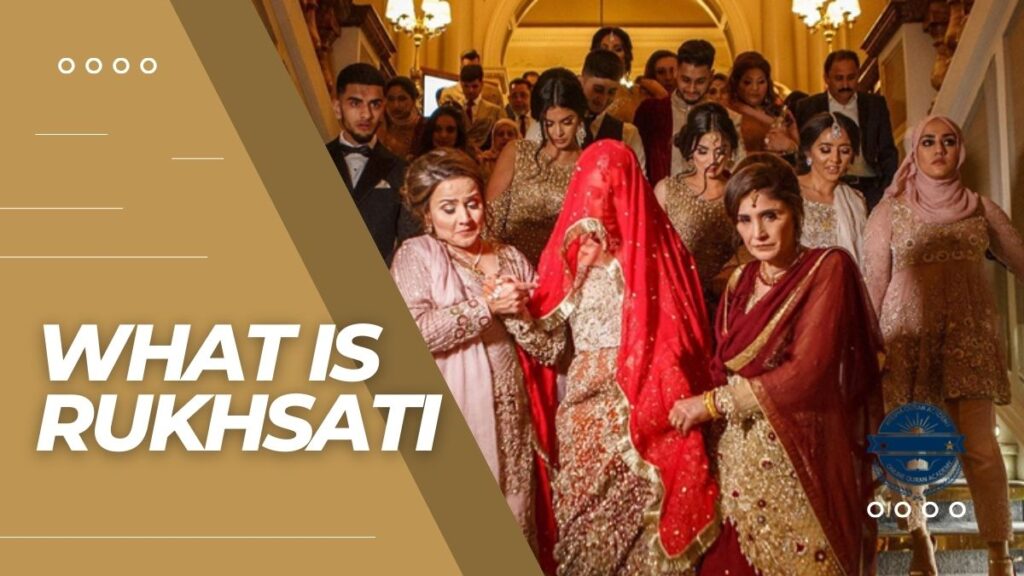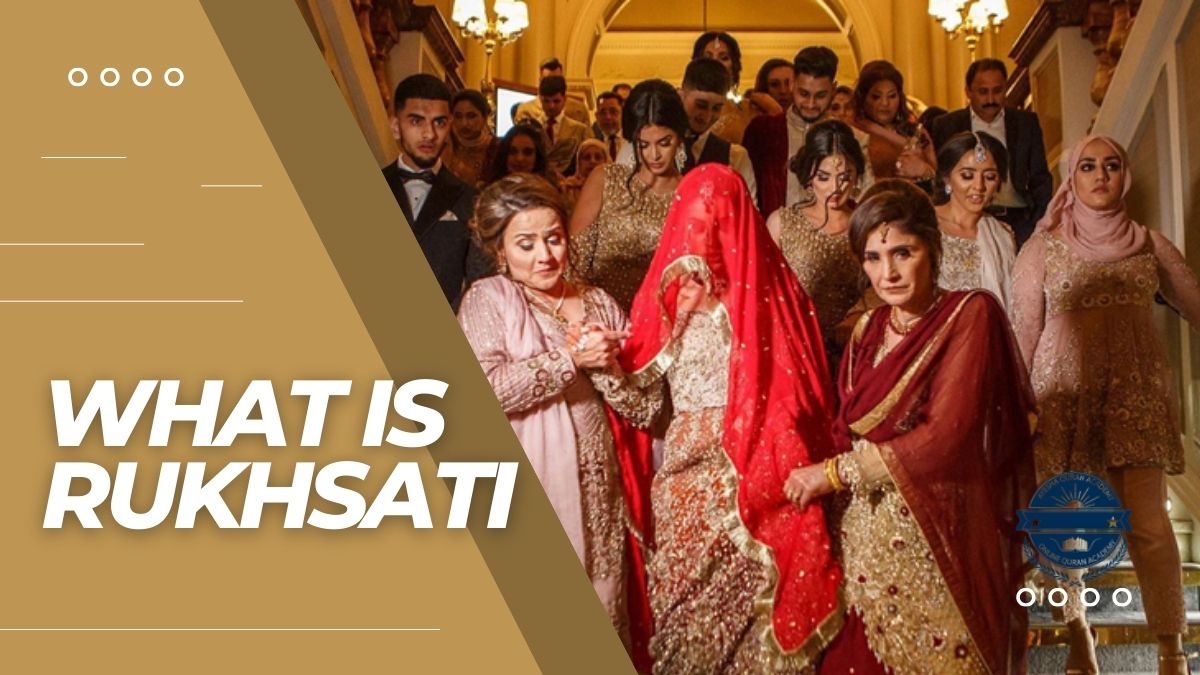In many cultures, weddings are a grand celebration marked by various rituals and traditions. One such significant tradition is “Rukhsati.”
If you’re curious about what Rukhsati is and its role in weddings, you’ve come to the right place. In this comprehensive guide.

Weddings are a beautiful union of two souls, celebrated with love, joy, and traditions. One of these traditions, Rukhsati, holds a special place. It’s not just a ritual; it’s a moment filled with profound emotions and cultural significance. Let’s take a closer look at what Rukhsati truly means and represents.
What Is Rukhsati?
Rukhsati, often spelled as “Rukhsti” or “Rokhsati,” is an Urdu word that translates to “departure” or “send-off.” It signifies the moment when the bride officially leaves her parental home and departs to start her new life with her husband. This event marks the transition from her maiden life to a life as a married woman.
It involves emotional farewells, blessings from family, and often symbolic gestures like throwing rice or flower petals to signify gratitude and love.
The Significance of Rukhsati
The significance of Rukhsati in the context of traditional weddings extends far beyond a mere send-off ceremony.
It is a profound and meaningful aspect of the nuptial journey, encompassing various layers of emotional and cultural importance.
Let’s delve into the details to gain a deeper understanding of why Rukhsati holds such a special place in South Asian weddings.
Embracing New Beginnings
At the heart of the Rukhsati tradition lies the idea of embracing new beginnings. It symbolizes the bride’s willingness to step into a new phase of her life as a married woman.
This transition is not merely physical, as she leaves her parental home, but also emotional, as she embarks on a journey with her life partner.
It signifies her readiness to create a new family, embrace responsibilities, and nurture relationships.
Family Blessings
Rukhsati is a moment when familial bonds are reinforced through blessings and well-wishes. As the bride prepares to leave her parents’ home, she seeks their blessings and the blessings of her elders.
This act is a heartfelt expression of gratitude and respect for the family that has nurtured and raised her. In return, family members shower her with love and good wishes for a prosperous and happy married life.
Emotional Farewell
Rukhsati is often an emotionally charged event, characterized by a bittersweet blend of joy and sorrow.
For the bride’s family, it can be a tearful farewell, as they bid adieu to a beloved daughter. The bride herself may experience a whirlwind of emotions—excitement for the new chapter ahead, sadness at leaving her childhood home, and the anticipation of the unknown.
These emotional expressions make Rukhsati a deeply moving and memorable part of the wedding.
Preservation of Tradition
Beyond the personal and emotional aspects, Rukhsati also plays a vital role in preserving cultural traditions.
It is a link to the past, a connection to the customs and rituals of ancestors. By adhering to this tradition, families not only honor their heritage but also pass down the values and practices that have been cherished for generations.
Rukhsati, in this sense, becomes a bridge between the old and the new, between tradition and modernity.
Strengthening Family Bonds
Rukhsati reinforces the bonds within the bride’s family and signifies unity. It serves as a reminder that while the bride is starting a new family, she remains an integral part of her parental family.
It is a celebration of family ties, and the love and support that continue to exist even as roles and relationships evolve.
The Rukhsati Tradition Around the World
While Rukhsati is a cherished tradition in South Asian weddings, its customs and practices can vary significantly across different countries and regions.
This diversity adds richness and depth to the cultural tapestry of Rukhsati. In this section, we will explore how Rukhsati is observed in various parts of the world.
Pakistan
In Pakistan, Rukhsati is a momentous event within the wedding ceremony. The bride, dressed in her bridal attire, is accompanied by her family and friends as she prepares to leave her parental home.
One of the most symbolic acts during Rukhsati is when the bride throws back a handful of rice or flower petals towards her family. This gesture signifies her gratitude and love for her upbringing and is a poignant moment filled with emotion.
Rukhsati in Pakistan is also marked by heartfelt farewells and blessings. Family members, especially parents, offer their blessings and well-wishes to the newlywed couple.
It is common to see tears of joy and sadness during this time, as the bride embarks on her new journey while leaving behind the home she grew up in.
India
In India, a similar tradition known as “Vidaai” is observed, which bears striking resemblance to Rukhsati. The Vidaai ceremony is a heartwarming and emotional moment where the bride says goodbye to her family and departs for her husband’s home.
During Vidaai, the bride is accompanied by her parents and close relatives, and they collectively seek blessings for her new life.
In some regions of India, there are unique customs associated with Vidaai. For example, in North India, it is customary for the bride to throw a handful of rice over her head towards her family. This act symbolizes the repayment of her debt to her parents for their love and care.
Bangladesh
In Bangladesh, ti is a joyful and celebratory occasion. The event often includes traditional songs and dances performed by family members and guests.
These performances add a lively and festive atmosphere to the send-off ceremony.
Similar to other South Asian cultures, Rukhsati in Bangladesh involves blessings and well-wishing. Family members offer their heartfelt prayers for the bride’s happiness and prosperity in her new life.
The emotional aspect of Rukhsati is also present in Bangladesh, with tears of both joy and nostalgia as the bride leaves her parental home.
Global Variations
While Pakistan, India, and Bangladesh share similar customs related to Rukhsati, it’s important to note that within each of these countries, there can be regional and cultural variations.
These variations are a testament to the diverse cultural landscape of South Asia and the importance of preserving unique traditions.
In some modern weddings, couples may choose to blend traditional Rukhsati customs with contemporary elements, creating a fusion of old and new.
This adaptability ensures that it remains a relevant and cherished tradition in the evolving context of today’s weddings.
Why is Ruksati Sad?
Rukhsati can be a sad and emotional moment for several reasons:
- Leaving Family Behind: One of the primary reasons for the sadness associated with Rukhsati is that the bride is leaving her parental home, often for the first time permanently. This separation from her family, whom she has known and lived with all her life, can be deeply emotional.
- Farewell to Childhood: Rukhsati marks the end of the bride’s life as a single woman and the beginning of her life as a married woman. It symbolizes the end of her childhood and the start of her journey into adulthood and married life. This transition can be bittersweet, as it involves leaving behind the carefree days of youth.
- Unknown Future: Rukhsati represents a step into the unknown. The bride is embarking on a new phase of life with her husband’s family, which may be unfamiliar territory. The uncertainty of what lies ahead can evoke feelings of sadness and apprehension.
- Family Bonds: Rukhsati is a reminder of the strong bonds between family members, especially between the bride and her parents. The act of saying goodbye can be emotionally charged, with tears flowing freely as family members bid farewell.
- Change in Roles: For both the bride and her family, it signifies a significant change in roles and relationships. Parents must let go of their daughter as she starts her own family, and the bride must adjust to her new role as a wife and daughter-in-law. These transitions can be accompanied by a sense of loss.
Conclusion
Rukhsati is a cherished tradition that beautifully encapsulates the essence of love, family, and new beginnings.
It’s a reminder that weddings are not just about rituals but about the emotions and bonds that tie families together.
Whether you’re a bride-to-be, a groom, or a curious observer, understanding the significance of Rukhsati adds depth and meaning to the celebration of love
Other Post
- Are Pop-Tarts Halal | Can Muslims Eat It? Latest
- Can Muslims Eat Kosher | Is It Halal Or Haram
- Can Muslims Celebrate Thanksgiving | Is It Halal Or Haram?
- Day of Judgment
- Is It Haram to Think Sexually?
FAQs
In Rukhsati, the bride officially leaves her parental home to start her new life with her husband. It involves emotional farewells, blessings from family, and often symbolic gestures like throwing rice or flower petals to signify gratitude and love.
Rukhsati has its roots in ancient South Asian customs, signifying the bride’s transition from her parental home to her husband’s home. It’s a tradition that has been cherished for generations.
Yes, there are variations in Rukhsati customs among different cultures and regions. These variations add to the richness and diversity of this tradition.
While Rukhsati is a common tradition, it may not be mandatory in all weddings. Some modern couples choose to adapt or omit certain customs based on personal preferences.
Brides often experience a mix of emotions during Rukhsati, including happiness, sadness, excitement, and nostalgia. It’s a deeply emotional moment for many.
The dress code for Rukhsati varies among cultures. It’s common for brides to wear traditional attire, but modern brides may opt for contemporary outfits.


